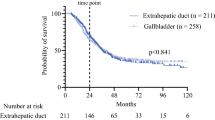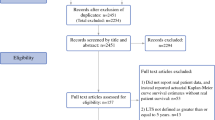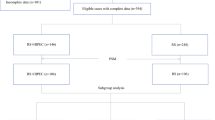Abstract
Background
Preoperative chemotherapy has been increasingly used in locally advanced gastric cancer (LAGC). However, the prognostic factors are still insufficient. This study aimed to investigate the prognostic significance of pathological response of the primary tumor to neoadjuvant chemotherapy (NACT) and the lymph node status after NACT.
Methods
Data from 160 patients with LAGC treated with NACT followed by gastrectomy and met the inclusion criteria between March 2016 and December 2019 were retrospectively reviewed. Pathological evaluation after NACT was based on the grade of pathological response of the primary tumor and the status of lymph node. Survival curves for overall survival (OS) and disease-free survival (DFS) were estimated using the Kaplan–Meier method, and the log-rank test was used to compare survival difference. Univariate and multivariate analyses for prognostic factors were based on the Cox regression.
Results
Among 160 selected cases, 90 had pathological response (PR), while 70 had no pathological response (nPR) to NACT. Smaller tumor size was presented in PR group, which also had lower level of signet ring cell features, compared to nPR group (all p < 0.05). Based on the status of lymph nodes, nodal status (−) group showed smaller tumor size, lower depth of tumor invasion, better differentiated degree, lower level of signet ring cell features, lower rate of lymphatic and venous invasion and less advanced ypTNM stage (all p < 0.05). Survival was equivalent between PR and nPR group (all p > 0.05), while patients with no lymph node metastasis had better DFS than that with lymph node metastasis (HR 0.301, 95% CI 0.194–0.468, p = 0.002). Multivariable Cox regression analysis identified that lymph node status after NACT was an independent prognostic factor associated with survival (OS: hazard ratio 1.756, 95% CI 1.114–3.278, p = 0.029; DFS: hazard ratio 1.901, 95% CI 1.331–3.093, p = 0.012).
Conclusion
Lymph node status is a potential independent prognostic factor for LAGC patients treated with NACT and may be more efficient than pathological response in primary tumor.



Similar content being viewed by others
Data availability
The datasets generated and/or analysed during the current study are available from the corresponding author on reasonable request.
References
Bray F, Ferlay J, Soerjomataram I, Siegel RL, Torre LA, Jemal A. Global cancer statistics 2018: GLOBOCAN estimates of incidence and mortality worldwide for 36 cancers in 185 countries. CA Cancer J Clin. 2018;68:394–424.
Sato Y, Okamoto K, Kawaguchi T, Nakamura F, Miyamoto H, Takayama T. Treatment response predictors of neoadjuvant therapy for locally advanced gastric cancer: current status and future perspectives. Biomedicines. 2022;10:1614.
Cunningham D, Allum WH, Stenning SP, Thompson JN, van de Velde CJ, Nicolson M, et al. Perioperative chemotherapy versus surgery alone for resectable gastroesophageal cancer. N Engl J Med. 2006;355:11–20.
Ychou M, Boige V, Pignon JP, Conroy T, Bouche O, Lebreton G, et al. Perioperative chemotherapy compared with surgery alone for resectable gastroesophageal adenocarcinoma: an FNCLCC and FFCD multicenter phase III trial. J Clin Oncol. 2011;29:1715–21.
Al-Batran S, Homann N, Pauligk C, Goetze TO, Meiler J, Kasper S, et al. Perioperative chemotherapy with fluorouracil plus leucovorin, oxaliplatin, and docetaxel versus fluorouracil or capecitabine plus cisplatin and epirubicin for locally advanced, resectable gastric or gastro-oesophageal junction adenocarcinoma (FLOT4): a randomised, phase 2/3 trial. Lancet. 2019;393:1948–57.
Achilli P, de Martini P, Ceresoli M, Mari GM, Costanzi A, Maggioni D, et al. Tumor response evaluation after neoadjuvant chemotherapy in locally advanced gastric adenocarcinoma: a prospective, multi-center cohort study. J Gastrointest Oncol. 2017;8:1018–25.
Liu ZN, Wang YK, Zhang L, Jia YN, Fei S, Ying XJ, et al. Comparison of tumor regression grading systems for locally advanced gastric adenocarcinoma after neoadjuvant chemotherapy. World J Gastrointest Oncol. 2021;13:2161–79.
Stark AP, Estrella JS, Chiang YJ, Das P, Minsky BD, Blum M, Mariela A, et al. Impact of tumor regression grade on recurrence after preoperative chemoradiation and gastrectomy for gastric cancer. J Surg Oncol. 2020;122:422–32.
Pereira MA, Ramos MF, Dias AR, Cardili L, Ribeiro RR, Charruf AZ, et al. Lymph node regression after neoadjuvant chemotherapy: a predictor of survival in gastric cancer. J Surg Oncol. 2019;121:795–803.
Lombardi PM, Mazzola M, Achilli P, Aquilano MC, de Martini P, Curaba A, et al. Prognostic value of pathological tumor regression grade in locally advanced gastric cancer: New perspectives from a single-center experience. J Surg Oncol. 2021;123:923–31.
Tong YL, Zhu YM, Zhao Y, Shan ZX, Zhang JJ, Liu D. Tumor regression grade predicts survival in locally advanced gastric adenocarcinoma patients with lymph node metastasis. Gastroenterol Res Pract. 2020;2020:3435673.
Becker K, Mueller JD, Schulmacher C, Ott K, Fink U, Busch R, et al. Tumor regression grade in gastric cancer: predictors and impact on outcome. J Surg Oncol. 2016;114:434–9.
Cho H, Nakamura J, Asaumi Y, Yabusaki H, Sakon M, Takasu N, et al. Long-term survival outcomes of advanced gastric cancer patients who achieved a pathological complete response with neoadjuvant chemotherapy: a systematic review of the literature. Ann Surg Oncol. 2015;22:787–92.
Xu W, Fan Z, Wang L, He C, Ni Z, Hua Z, et al. Prediction model of objective response after neoadjuvant chemotherapy in patients with locally advanced gastric cancer. Am J Transl Res. 2021;13:1568–79.
Smyth EC, Fassan M, Cunningham D, Allum WH, Okines AF, Lampis A, et al. Effect of pathologic tumor response and nodal status on survival in the Medical Research Council Adjuvant Gastric Infusional Chemotherapy Trial. J Clin Oncol. 2016;34:2721–7.
Wang XZ, Zeng ZY, Ye X, Sun J, Zhang ZM, Kang WM. Interpretation of the development of neoadjuvant therapy for gastric cancer based on the vicissitudes of the NCCN guidelines. World J Gastrointest Oncol. 2020;12:37–53.
Smyth EC, Verheij M, Allum W, Cunningham D, Cervantes A, Arnold D. Gastric cancer: ESMO clinical practice guidelines for diagnosis, treatment and follow-up. Ann Oncol. 2016;27:38–49.
Wang X, Li S, Sun Y, Li K, Shen X, Xue Y, et al. The protocol of a prospective, multicenter, randomized, controlled phase III study evaluating different cycles of oxaliplatin combined with s-1 (SOX) as neoadjuvant chemotherapy for patients with locally advanced gastric cancer: RESONANCE-II trial. BMC Cancer. 2021;21:20.
Zhang XT, Liang H, Li ZY, Xue YW, Wang YN, Zhou ZW, et al. Perioperative or postoperative adjuvant oxaliplatin with S-1 versus adjuvant oxaliplatin with capecitabine in patients with locally advanced gastric or gastro-oesophageal junction adenocarcinoma undergoing D2 gastrectomy (RESOLVE): an open-label, superiority and non-inferiority, phase 3 randomised controlled trial. Lancet Oncol. 2021;22:1081–92.
Westerhoff M, Osecky M, Langer R. Varying practices in tumor regression grading of gastrointestinal carcinomas after neoadjuvant therapy: results of an international survey. Mod Pathol. 2020;33:676–89.
Nakauchi M, Vos E, Tang LH, Gonen M, Janjigian YY, Ku GY, et al. Outcomes of neoadjuvant chemotherapy for clinical stages 2 and 3 gastric cancer patients: analysis of timing and site of recurrence. Ann Surg Oncol. 2021;28:4829–38.
Zhong Q, Chen QY, Parisi A, Ma YB, Lin GT, Desiderio J, et al. Modified ypTNM staging classification for gastric cancer after neoadjuvant therapy: a multi-institutional study. Oncologist. 2021;26:99–110.
Song C, Chung JH, Kang SB, Kim DW, Oh HK, Lee HS, et al. Impact of tumor regression grade as a major prognostic factor in locally advanced rectal cancer after neoadjuvant chemoradiotherapy: a proposal for a modified staging system. Cancers. 2018;10:319.
Noble F, Lloyd MA, Turkington R, Griffiths E, O’Donovan M, O’Neill JR, et al. Multicentre cohort study to define and validate pathological assessment of response to neoadjuvant therapy in oesophagogastric adenocarcinoma. Br J Surg. 2017;104:1816–28.
Ikoma N, Estrella JS, Blum MM, Das P, Minsky BD, Mansfield P, et al. Tumor regression grade in gastric cancer after preoperative therapy. J Gastrointest Surg. 2021;25:1380–7.
Becker K, Mueller JD, Schulmacher C, Ott K, Fink U, Busch R, et al. Histomorphology and grading of regression in gastric carcinoma treated with neoadjuvant chemotherapy. Cancer. 2003;98:1521–30.
Wang LB, Teng RY, Jiang ZN, Hu WX, Dong MJ, Yuan XM, et al. Clinicopathologic variables predicting tumor response to neoadjuvant chemotherapy in patients with locally advanced gastric cancer. J Surg Oncol. 2012;105:293–6.
Lorenzen S, Blank S, Lordick F, Siewert JR, Ott K. Prediction of response and prognosis by a score including only pretherapeutic parameters in 410 neoadjuvant treated gastric cancer patients. Ann Surg Oncol. 2012;19:2119–27.
Ott K, Blank S, Ruspi L, Bauer M, Sisic L, Schmidt T. Prognostic impact of nodal status and therapeutic implications. Transl Gastroenterol Hepatol. 2017;2:15.
Wu ZM, Teng RY, Shen JG, Xie SD, Xu CY, Wang LB. Reduced lymph node harvest after neoadjuvant chemotherapy in gastric cancer. J Int Med Res. 2011;39:2086–95.
Xu X, Zheng GL, Zhang T, Zhao Y, Zheng ZC. Is pathologic tumor regression grade after neo-adjuvant chemotherapy a promising prognostic indicator for patients with locally advanced gastric cancer? A cohort study evaluating tumor regression response. Cancer Chemothe Pharmacol. 2019;84:635–46.
Zhu YL, Sun YK, Xue XM, Yue JY, Yang L, Xue LY. Unnecessity of lymph node regression evaluation for predicting gastric adenocarcinoma outcome after neoadjuvant chemotherapy. World J Gastrointest Oncol. 2019;11:48–58.
Funding
This research was supported by National High Level Hospital Clinical Research Funding (High-level Hospital Construction Project of Guangdong Provincial People's Hospital) (grant no. 2022-PUMCH-B-005).
Author information
Authors and Affiliations
Contributions
Su PF, Jiang L, Yu JC conceived and designed the analysis; Su PF, Jiang L, Zhang YJ, Yu T collected the data; Su PF, Kang WM, Liu YQ, Yu JC performed the analysis; Su PF wrote the paper: all authors reviewed and revised the manuscript.
Corresponding author
Ethics declarations
Conflict of interest
Conflict of interest relevant to this article was not reported.
Ethical approval
Clinical samples were gathered with written informed consent of patients according to a protocol reviewed and approved by the Institutional Review Board of Peking Union Medical College Hospital (IRB number: JS-2587).
Informed consent
Informed consent was obtained from all individual participants included in the study.
Additional information
Publisher's Note
Springer Nature remains neutral with regard to jurisdictional claims in published maps and institutional affiliations.
Rights and permissions
Springer Nature or its licensor (e.g. a society or other partner) holds exclusive rights to this article under a publishing agreement with the author(s) or other rightsholder(s); author self-archiving of the accepted manuscript version of this article is solely governed by the terms of such publishing agreement and applicable law.
About this article
Cite this article
Su, P., Zhang, Y., Yu, T. et al. Comparison of the predictive value of pathological response at primary tumor and lymph node status after neoadjuvant chemotherapy in locally advanced gastric cancer. Clin Transl Oncol 25, 2462–2471 (2023). https://doi.org/10.1007/s12094-023-03130-8
Received:
Accepted:
Published:
Issue Date:
DOI: https://doi.org/10.1007/s12094-023-03130-8




